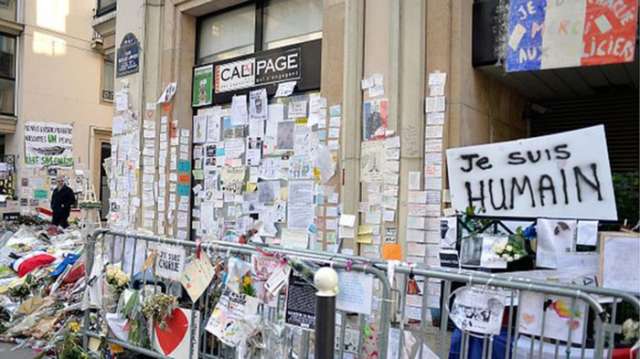It was, as much as anything, a story of survival; of the bravery and friendship highlighted by the horrific attack.
Survivors spoke of the close ties between staff members. A few days after her colleagues had died, reporter Zineb el-Rhazoui told me those left behind had "wanted to meet, wanted to touch each other". Creating the next issue of the paper was a way of honouring the bonds they felt as a team, she said.
Nine months on, the focus has switched to infighting and resignations at Charlie Hebdo. It was like watching a football team in transfer season, said one French journalist.
Over the past few weeks, the paper`s senior cartoonist, Luz - the man who designed that famous green cover of the first edition after the attacks - has announced his resignation. And columnist Patrick Pelloux has announced he will leave by the end of the year.
Charlie Hebdo cartoonist, Renald Luzier (C) aka Luz and Patrick Pelloux (R), Charlie Hebdo journalist, during the Charlie Hebdo press conference held at the Liberation offices in Paris on January 13, 2015 in Paris.
"Charlie Hebdo died on 7 January, and part of us died with the victims," Mr Pelloux told me.
"We had to go on, to show our courage. But being strong is also about being able to turn a page and letting others take on the fight. Charlie Hebdo is dead. Today there is a new Charlie Hebdo - one that has become a world symbol of free speech and good journalism."
Shortly after the attacks, more than a million people marched through the streets of Paris to show solidarity with Charlie Hebdo.
Almost overnight, the paper and its staff became a worldwide symbol for free speech. And that is a lot of pressure for anyone, says Laurent Joffrin, editor of France`s Liberation newspaper.
"A working-class hero is a hard thing to be, and a freedom of speech hero is a hard thing to be," he says. "They were not trained to become that - they were trained to do drawings in their small paper."
For most of the next nine months, Charlie Hebdo`s small team of staff worked out of the offices of the French newspaper Liberation.
Now they have just moved to a new permanent home. But Mr Joffrin says the continued security risk still weighs heavy on every member of staff.
"The threat against them is very high," he told me.
"Every Islamist in the world dreams of killing one of those guys. And so they have to live in their apartments with their curtains closed because they`re afraid of snipers. They live in the dark. And it`s probably going to last the rest of their lives. It shows that those who go on are especially courageous."
Mr Joffrin says the paper has not changed its values as a result of the attack.
But others disagree. Both Luz and the paper`s new director, Riss, have said they are not drawing the Prophet Mohammed anymore.
Reporter Zineb el-Rhazoui says she is worried that security fears are prompting a change of editorial direction.
"I wonder if this is a kind of withdrawal, in order to make the terrorists more serene, and forget us. If it is such a strategy, I believe it`s a wrong strategy because when you accept the limits they want to put on you, they will put other limits on you."
Zineb el-Rhazoui, along with 14 other staff, published an open letter earlier this year, calling for the paper to stay true to its values.
But the editorial disputes, common to any media organisation, have been complicated by another, unexpected consequence of the January attack: money.
"It`s complicated things," she says.
"Charlie Hebdo was a poor newspaper before the attacks, and after 7 January we received money from everywhere, a lot of money. We became one of the richest newspapers in France. And the problem is that the money and the power to make decisions are concentrated in the hands of just two shareholders."
The attacks killed three of the paper`s five shareholders, including its founder and director, Charb.
The surviving shareholders, including Riss, have said that 100% of the profits from this year will be reinvested into the paper.
Donations will be divided up among the victims and their families - but even that is causing disputes over how to share out the funds.
For some, the human loss on 7 January has also meant the loss of something essential at the paper. To paraphrase Patrick Pelloux: Charlie Hebdo is dead, long live Charlie Hebdo.
More about:
















































